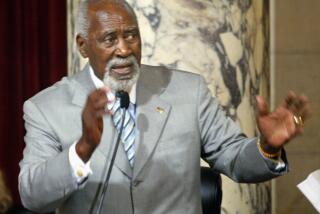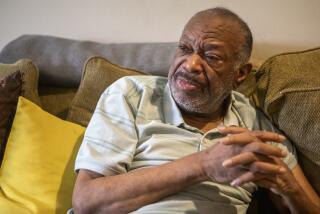The Worlds of Business and Politics Lose a Friend
- Share via
Commerce Secretary Ronald H. Brown carried his message of “trade, not aid” around the world, taking business leaders with him to Bosnia, Haiti, South Africa, Northern Ireland, the Middle East and elsewhere in search of profits for U.S. firms and, in many cases, to offer help in rebuilding war-torn countries. He was on just such a mission Wednesday with top American executives, government officials and reporters when their Air Force jet went down in bad weather on a hillside in Croatia. The State Department said all 33 on board are presumed dead. The losses will be felt widely.
Brown’s easy style and political acumen opened doors for many American businesses abroad. A strong advocate of free trade, he exported capitalism through his can-do spirit. Business leaders always gave him high marks. His mastery of the intricacies both of old-fashioned politics and bottom-line business will be hard to match.
On receiving news of the fatal crash, President Clinton praised Brown, an old friend who resuscitated a moribund Democratic Party in advance of the 1992 presidential campaign. As head of the Democratic National Committee, Brown was the architect of Clinton’s long-shot campaign for the presidency.
Born in the District of Columbia and raised in Harlem, Brown’s rise was no rags-to-riches story. His college-educated parents managed the famous Hotel Theresa, a mecca for entertainers, athletes and politicians ranging from Richard Nixon to Fidel Castro. Comfortable in powerful circles, Brown worked for the Urban League, initially running a job training program and doing social work. After completing law school, he rose through the Urban League ranks in Washington.
Often a pioneer in racial advancement, he was the first black chief counsel of a standing Senate committee, the Judiciary Committee. In the political realm, he choreographed Sen. Edward M. Kennedy’s 1980 upset victory in California’s presidential primary and became a chief aide to the Massachusetts Democrat.
Later he worked with Jesse Jackson and was a consensus-building manager of the 1988 Democratic National Convention. Politics was his passion.
Brown made his fortune as the first black partner of a prestigious Washington law firm. Its specialty was lobbying, and some of his financial deals were investigated by congressional committees and the Justice Department.
Ron Brown, 54, moved adroitly in all circles, as comfortable with foreign heads of state and Fortune 500 CEOs as he was with old friends of his family. For all he could have done to make money only for himself, he chose to spend most of his career in public service.
More to Read
Get the L.A. Times Politics newsletter
Deeply reported insights into legislation, politics and policy from Sacramento, Washington and beyond. In your inbox three times per week.
You may occasionally receive promotional content from the Los Angeles Times.










